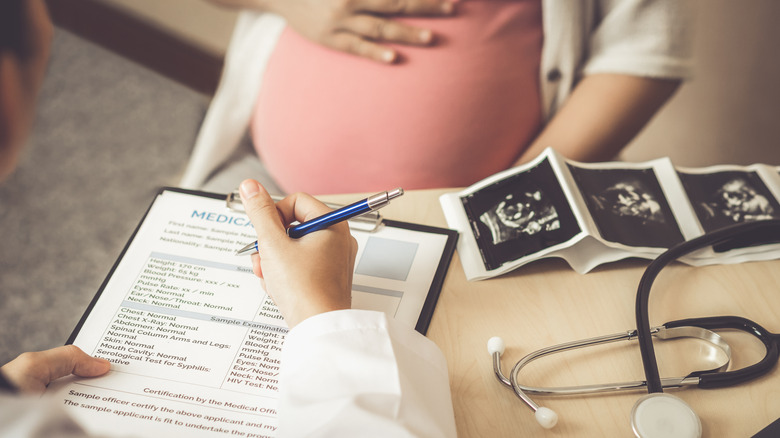Is It Safe To Donate Blood While Pregnant?
Choosing to donate your blood at a donation center will help those in need and can save lives. By being so selfless and giving, you can also reap some health benefits yourself. According to Healthline, helping others in this way can improve both your physical and emotional health. As well as providing a sense of belonging, helping others can reduce stress. Rasmussen University reports that the mini-physical performed when giving blood could also bring awareness to any health problems you may have, and may even reduce the risk of a heart attack by lowering high levels of iron in the blood.
The American Red Cross explains that blood donations are an especially important way of helping others because they are utilized for individuals who are in need of cancer treatment, surgery, or blood transfusions due to blood loss from an injury or accident.
While the idea of helping others by donating blood can be very compelling, there are some restrictions to giving blood. According to the American Red Cross, people under 17 years old, those with acute infections, those who have had the ebola virus, and those who are HIV positive are just some individuals who are unable to donate.
Consequently, because everything an expecting mother does during pregnancy also affects her baby, she may wonder if donating blood would be harmful to her and her baby, as well as if she would even be eligible to do so.
Can a pregnant woman donate blood?
Expectant mothers aren't eligible to donate blood during pregnancy, as doing so isn't considered safe for pregnant women. According to Healthline, some research suggests that donating blood may put someone at an increased risk of anemia. The risk of anemia is already high for pregnant women, as Medical News Today reports that 52% of women who are pregnant have an iron deficiency. Iron deficiency anemia that's left untreated can have adverse effects on an unborn baby, such as leading to premature birth or low birth weight.
Due to these complications, the World Health Organization (WHO) recommends waiting 9 months, or at least as many months as the length of your pregnancy, before donating blood. In addition, breastfeeding mothers shouldn't donate blood.
If you're pregnant and still feel the desire to donate blood and save the lives of others, all hope is not lost. Medical News Today reports that mothers are able to donate the remaining blood in the umbilical cord, as well as the placenta after their baby is born. In fact, this type of donation is unique in that the blood contains stem cells, which can help treat leukemia, lymphoma, and sickle cell disease. You can speak with a doctor if this is something that you're interested in.
If you're unable to donate blood for any reason and still want to make a difference, the American Red Cross shares that you can also volunteer or host a blood drive.


